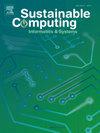Optimizing task offloading with metaheuristic algorithms across cloud, fog, and edge computing networks: A comprehensive survey and state-of-the-art schemes
IF 3.8
3区 计算机科学
Q1 COMPUTER SCIENCE, HARDWARE & ARCHITECTURE
引用次数: 0
Abstract
The Internet of Things (IoT) significantly impacts various industries, enabling better connectivity and real-time data exchange for applications ranging from smart cities to healthcare. Integrating cloud, fog, and edge computing is essential for managing increased data and processing needs as IoT networks become complex. Cloud computing provides extensive storage and powerful computing capabilities but can experience delays due to the distance data must travel. Fog computing addresses these delays by processing data closer to its source, while edge computing reduces them even further by processing data directly on IoT devices. Effective management of these computing layers requires strategic task offloading, which involves moving tasks to the most appropriate computing layer to balance latency, energy consumption, and operational efficiency. Several strategies have been developed to optimize network communication and task offloading, with metaheuristic algorithms emerging as promising approaches. Inspired by natural processes, these algorithms are skilled at searching complex spaces to find near-optimal solutions for efficient and dynamic task offloading. This review provides a detailed analysis of how metaheuristic algorithms optimize task offloading. It evaluates their effectiveness in improving system performance, managing resources, and reducing costs. The review also identifies the current challenges in this area and suggests future research directions to advance this field.
使用跨云、雾和边缘计算网络的元启发式算法优化任务卸载:全面调查和最先进的方案
物联网(IoT)对各个行业产生了重大影响,为从智能城市到医疗保健等应用程序提供了更好的连接和实时数据交换。随着物联网网络变得越来越复杂,集成云、雾和边缘计算对于管理不断增长的数据和处理需求至关重要。云计算提供广泛的存储和强大的计算能力,但由于数据必须传输的距离,可能会出现延迟。雾计算通过在更靠近数据源的地方处理数据来解决这些延迟,而边缘计算通过直接在物联网设备上处理数据进一步减少了这些延迟。对这些计算层的有效管理需要战略性地卸载任务,这涉及到将任务转移到最合适的计算层,以平衡延迟、能耗和操作效率。已经开发了几种策略来优化网络通信和任务卸载,其中元启发式算法作为有前途的方法出现。受自然过程的启发,这些算法擅长于搜索复杂空间,为高效和动态的任务卸载找到接近最优的解决方案。这篇综述提供了元启发式算法如何优化任务卸载的详细分析。它评估它们在改进系统性能、管理资源和降低成本方面的有效性。本文还指出了该领域目前面临的挑战,并提出了未来的研究方向,以推进该领域的发展。
本文章由计算机程序翻译,如有差异,请以英文原文为准。
求助全文
约1分钟内获得全文
求助全文
来源期刊

Sustainable Computing-Informatics & Systems
COMPUTER SCIENCE, HARDWARE & ARCHITECTUREC-COMPUTER SCIENCE, INFORMATION SYSTEMS
CiteScore
10.70
自引率
4.40%
发文量
142
期刊介绍:
Sustainable computing is a rapidly expanding research area spanning the fields of computer science and engineering, electrical engineering as well as other engineering disciplines. The aim of Sustainable Computing: Informatics and Systems (SUSCOM) is to publish the myriad research findings related to energy-aware and thermal-aware management of computing resource. Equally important is a spectrum of related research issues such as applications of computing that can have ecological and societal impacts. SUSCOM publishes original and timely research papers and survey articles in current areas of power, energy, temperature, and environment related research areas of current importance to readers. SUSCOM has an editorial board comprising prominent researchers from around the world and selects competitively evaluated peer-reviewed papers.
 求助内容:
求助内容: 应助结果提醒方式:
应助结果提醒方式:


